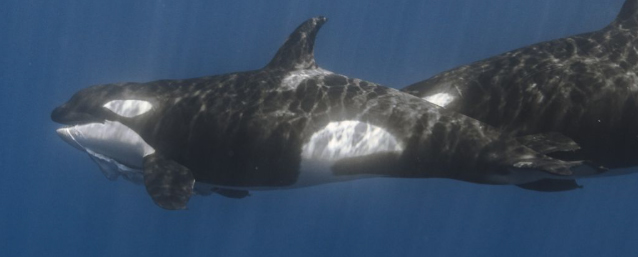||| FROM SCIENCE ALERT |||
When they’re wearing salmon hats and terrorizing yachts, it’s easy, perhaps, to forget that orcas are the most fearsome large predator lurking beneath the waves.
Here comes a sobering reminder. A pod of orcas (Orcinus orca) that patrol the Gulf of California have devised collaborative hunting techniques to take down the biggest fish in the ocean: the magnificent, filter-feeding whale shark (Rhincodon typus).
On multiple occasions, the pod – including a male named Moctezuma – have been observed hunting the gentle giants in a manner scientists believe may be similar to how another, unrelated group halfway across the world pursues and kills the white sharks off South Africa to slurp up their delicious, oily, fatty livers.
“It’s not really surprising that they hunt the whale sharks, as well,” marine biologist Erick Higuera Rivas of Conexiones Terramar told ScienceAlert.
“What’s surprising is seeing the interaction between two such charismatic species of the oceans and also how this specific pod knows how to adapt and has acquired different types of strategies to hunt different prey. In the case of hunting whale sharks, this pod uses teamwork efforts and specific hunting techniques to immobilize the sharks and extract the internal organs, specifically the liver.”
All the world’s orcas are classified as the same species, but groups in different regions around the world are relatively distinct from one another. There are physical differences between the groups, and nor do they intermingle. Some marine scientists believe that we are observing speciation in action.
Another way these groups of orcas, known as ecotypes, differ is in their hunting and dietary strategies. Some groups predominantly feed on fish such as salmon; others on mammals such as seals, or even large whales.
**If you are reading theOrcasonian for free, thank your fellow islanders. If you would like to support theOrcasonian CLICK HERE to set your modestly-priced, voluntary subscription. Otherwise, no worries; we’re happy to share with you.**









“Terrorizing yachts” — I see the Orcas defending their homes from the humans terrorizing the them.
“sobering reminder” — Here’s a “sobering reminder”: Humans kill around 100 million sharks per year, which is an average of almost 274,000 sharks every day, over 11,000 sharks every hour, and around three sharks every second.
I’d love to see more scientists spend some time studying the motivations of the human-made holocaust on wildlife, the most fascinating, horrific, ecocidal, and suicidal behavior on planet Earth.